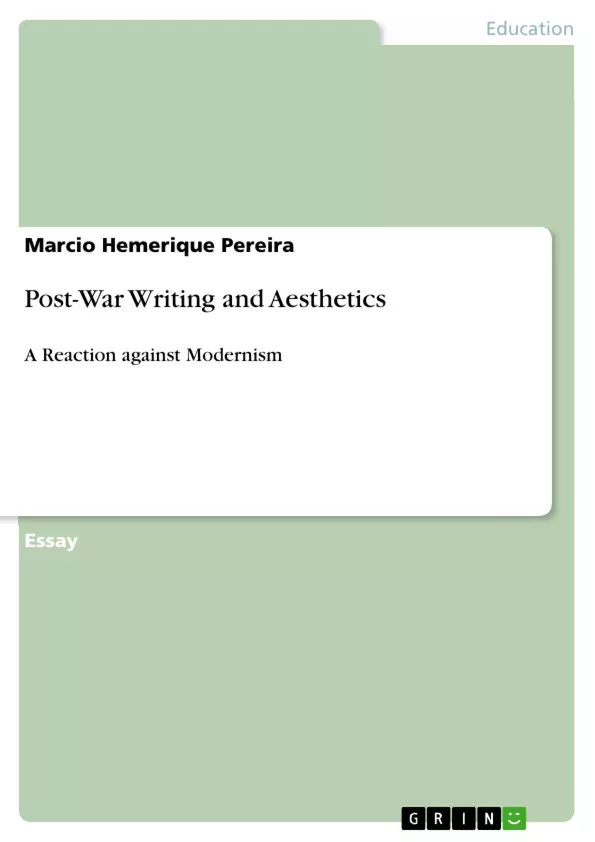The present essay proposes to analyze Philip Larkin’s statement: ‘[T]he term ‘modern’, when applied to art, has a more than chronological meaning: it denotes a quality of irresponsibility peculiar to this century […] [T]he artist has become over-concerned with his material (hence an age of technical experiment), and, in isolation, has busied himself with the two principal themes of modernism, mystification and outrage [...],’ in a peculiar perspective – How far can post-war writing and aesthetics be construed as a reaction against modernism? Exploring these forms intrinsically attached to public and private concerns of the Post-Modernism which were issues to that society, I will try to go beyond the text message and understand what Larkin intended to say to the post-modern society and the implications it had in our society after that. Equally important, relate the motifs over Post-War writing and Aesthetics and Modernism inside-out world. Finally, the essay tangles the different efforts of the Modern and Post-Modern writers when using representative forms of speech and what considers being a more viable and broader definition of that Aesthetics.
Table of Contents
- Modernism and Literature: A look into Modern Art
- Some Modern Art Works
Objectives and Key Themes
This essay examines Philip Larkin's view on modernism, specifically exploring the extent to which postwar writing and aesthetics can be considered a reaction against it. The essay analyzes the inherent connection between these art forms and the public and private concerns of the postmodern era, aiming to decipher Larkin's message for postmodern society and its implications for subsequent generations. Moreover, it explores the relationship between postmodern writing and aesthetics, and the "inside-out" world of modernism, and analyzes the distinct approaches of modern and postmodern writers in terms of their use of language and aesthetic principles.
- Modernism's influence on postwar writing and aesthetics
- The connection between art and societal concerns in the postmodern era
- Larkin's message for postmodern society and its implications
- The relationship between postmodern writing and aesthetics and the "inside-out" world of modernism
- Comparative analysis of modern and postmodern writing styles and aesthetic principles
Chapter Summaries
-
Modernism and Literature: A look into Modern Art
This section delves into the origins of modernist literary style, tracing its roots to the chaos and disillusionment following World War I. It explores the impact of the war on the belief in universal truth, the loss of faith in authority, and the emergence of a new spirit of progress driven by mechanization. The essay highlights the evolution of this new literature during World War II, characterized by a thriving technological landscape and the dissemination of knowledge and information. It concludes by highlighting the post-war era's unique conditions, particularly in Britain, where the prevailing mood was one of disillusionment and a rejection of established bourgeois norms.
-
Some Modern Art Works
This section explores specific examples of modernist art works, highlighting their characteristic embrace of chaos and radical discontinuity. It examines the works of authors such as Kathy Acker, whose novel 'The Child Like Life of the Black Tarantula' exemplifies the modernist tendency towards extreme profanity, violence, fragmented narratives, and a rejection of conventional morality. The essay also analyzes the works of William Burrough, known for his negative poetics that challenged societal norms, and Thomas Pynchon, who incorporated social forces and narrative in his works such as 'Gravity's Rainbow'. The section concludes by discussing Berman's concept of a paradoxical unity in modern environments and experiences, where diverse cultures and identities converge resulting in contradictions, ambiguity, and anguish.
Keywords
This preview focuses on the relationship between modernism and postmodernism, exploring themes of art, aesthetics, literature, societal concerns, and social change. It examines key concepts such as modernism's impact on postwar writing and aesthetics, the emergence of postmodernism as a reaction to the chaos of modernism, and the distinct stylistic approaches of modern and postmodern writers. The preview also highlights the significance of social and cultural factors in shaping artistic expressions and the role of language in conveying meaning and exploring themes of identity, morality, and social reality.
Frequently Asked Questions
How is post-war writing a reaction against modernism?
Post-war writing often rejected the "irresponsibility" and technical experimentation of modernism, focusing more on public and private concerns of the post-modern society and a disillusionment with established norms.
What was Philip Larkin's critique of modern art?
Larkin viewed modernism as a period of "mystification and outrage" where artists became over-concerned with technical experiments and material, leading to an isolation from the audience.
How did World War I influence modernist literature?
The chaos and disillusionment following WWI led to a loss of faith in universal truths and authority, sparking a new spirit of progress through mechanization and fragmented narrative styles.
Who are some key authors mentioned in the context of modernist art?
The essay discusses authors like Kathy Acker, William Burroughs, and Thomas Pynchon, highlighting their use of fragmented narratives and rejection of conventional morality.
What is the "inside-out" world of modernism?
It refers to the modernist focus on internal consciousness, ambiguity, and the Convergence of diverse identities that often result in contradictions and anguish.
- Quote paper
- MA Marcio Hemerique Pereira (Author), 2010, Post-War Writing and Aesthetics, Munich, GRIN Verlag, https://www.grin.com/document/204918



